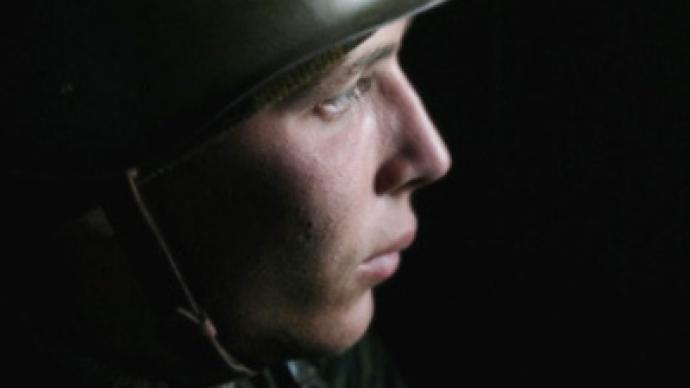Crisis stalls military reform – generals rejoice

The controversial reform of the Russian armed forces announced by the defence minister last October faces a major change of schedule. The ministry lacks funding for the planned rapid military transformation.
The reform – which is meant to radically change the face of the Russian Army, Navy and Air Force – was scheduled to be finished by 2012, but recently President Medvedev said the deadline for the downsizing of the military is 2016. The Defence Ministry later said they were not going to change their plans, but insiders hint that the ministry is already behind the schedule and doesn’t have enough money to carry out all the changes they want, and with the global credit crisis gaining momentum this is unlikely to change.
“The crisis puts a definite end to this reform of Serdyukov, because such a large-scale transformation, or rather breakage, of the army he has in mind needs massive expenditures. Even a year ago when our economy seemed on the rise and was full of money, experts couldn’t understand where such huge sums would come from. And now when everything shrinks, when expenditures are cut, this reform cannot go on.”Vladislav Shurigin, military expert
All military experts agree that a radical reform of the Russian armed forces is long overdue. Indeed, all defence ministers in post-soviet Russia had plans on how to make the relic of the Cold War into a modern organisation capable of dealing with modern threats. The Russian military is suffering from a number of problems, including aging hardware, lack of prestige of the career in the service, and corruption to name a few, but for whatever reasons the reforms were never implemented in full scale.
A change we can believe in… Serdyukov’s way
In October 2008, the current Defence Minister Anatoly Serdyukov announced his plan for a military transformation. The reform can be called the most ambitious one in decades, and one of the most controversial as well. Many senior officers heavily criticised it, and media reported of a ‘mutiny’ against it by top brass, which the ministry strongly denied.
Proponents of the reform suggest the resistance is due to conservative, and sometimes corrupt, generals being unprepared to part with their perks and learn modern warfare unfamiliar to them.
“Let’s call things with their names: these divisions and regiments, which are meant to receive mobilized reserves and deploy in case of threat, have long become a costly anachronism. Since the creation of nuclear weapons, wars with multimillion armies of the superpowers engaged in trench warfare have become things of the past.”Lieut.-Gen. Vladimir Shamanov,
Advisor for Defence Minister (2006-2007),
Chechen campaigns veteran
Critics believe it will leave the armed forces blooded and unable to defend the country in a real war. They also blame the ministry for preparing the reform in secrecy. Some even claim a camarilla of unnamed generals is manipulating Serdyukov, who is a civilian and has no military background, into painful and harmful changes that will lead to consequences he cannot foresee.
With the collapse of the Soviet Union and the end of conflict between ideologies, the possibility of a total war has become diminishing, especially with the nuclear shield in full readiness, many experts say. Modern warfare is that of regional low-intensity conflicts, like the one that followed Georgia’s attack on South Ossetia and Russia’s involvement or the latest Israeli operation in Gaza. The modern military should be tailored to win such rapid and local conflicts, not the wars of the past.
Strength reduction
The reform announced by Minister Serdyukov generally follows this goal. The biggest change he is pushing for is the rapid downsizing of the armed forces. Their current servicemen number is 1.13 million, while by 2012 (or by 2016 in another version) it will be lowered to one million.
The strength of officer’s corps will be dramatically lowered from 355,000 to just 150,000. The more than twofold cut is somewhat mitigated by the facts that 40,000 of the positions are vacant at the moment, and that many of military logistics officers including medics, judges and journalists will be turned into civilians. Among those axed are also generals, especially those due for retirement over old age. Their number is expected to be reduced from 1,107 to 886.
“The victory in a limited theatre of war has convinced the leadership of the country that small mobile units are a way to success in any modern conflict. But the validity of this particular decision can be tested only in a big war.”Army General Igor Rodionov,
Defence Minister (1996-1997)
In addition, Serdyukov wants to change the structure of non-commissioned officers’ corps. At the moment there are NCO ranks of praporshchik and midshipman in the Russian Army and Navy respectively. These ranks correspond to warrant officers in the U.S. military. The ranks will be abolished altogether, and their functions transferred to contracted sergeants, who will become the new backbone of the armed forces. New non-coms will also take some technical duties currently charged to officers. The NCOs now in service will be partially retired and partially promoted to officers or demoted to sergeants. Of the 140,000 people currently in service some 21,000 are expected to stay by the end of reform.
Those behind the reduction of troops say it will help straighten out the structure of the officers’ corps. At the moment there are more majors in the armed forces than there are lieutenants. It will also have elder officers retired and revamp the NCO personnel. The latter may be long overdue as the non-coms have been notorious for their corruption ever since late soviet times. Since the number of people on the payroll drops, those remaining will have their salaries increased, which is essential if the military want to compete with civil employers for staff.
Critics say the timeline for the reduction is too short and the way it was announced had a devastating effect on morale. For instance, the NCOs’ corps reform is estimated to take as long as 15 years, rather than four or eight. Otherwise there will be not enough time to train sergeants to replace retiring praporshchiks and midshipmen.
The sudden announcement of the downsizing with no public discussion or a detailed plan made the military unsure of their future, critics say. Those most active and talented will not be waiting for a retirement notice and leave the service themselves, leaving behind the inert and less skilled, which will effectively cripple the armed forces.
Structural changes “A crucial decision for national security must not be taken behind the stage. They require meticulous calculation and discussion, including that in the upper and lower chambers of the Parliament, by the Security Council and other institutions. Neither Anatoly Serdyukov nor other officials from the Defence Ministry managed to give answers to the questions over the reasoning for such a radical change in the Armed Forces.”
Mikhail Babich
Deputy Chair of the State Duma’s Defence Committee
The reduction of strength will be accompanied by a major change in the organisation of the armed forces. Currently there is a four-tier command and control structure: the military district, army, division, and regiment. It has not changed since the mid 1950s, but the Defence Ministry wants it replaced with a three-tier structure similar to that used in NATO armed forces: military district, operational command, and brigade.
Sacrificed in the new structure will be the so-called cadre units. Those are units that are not fully manned during peacetime, with only officer corps and servicemen needed for equipment maintenance in service. These units are meant to be beefed up to full size with reservists in case of a wartime mobilisation. Cadre units will be totally abandoned in the new structure, leaving behind only full combat readiness units in the service. This will contribute to the planned reduction of the officers’ number.
The total number of military units in Russia will drop from 1,890 to 172 in the Army, from 340 to 180 in the Air Forces, from 240 to 123 in the Navy. Missile Troops and Space Troops will be mostly untouched by this reform though. With a decreased complexity of the armed forces the Defence Ministry plans to reduce central command and control bodies as well.
The logic behind the change is obvious: a three-tier structure allows better mobility and independence of units in the battlefield. The command scheme is successfully used by many modern armies and was successfully tested by Russian armed forces in the second Chechen campaign and more recently during the war in South Ossetia.
As for cadre units, they are a heavy burden for the military budget and are unlikely to be needed. Any large-scale attack on Russia will take time to prepare, and it means there will also be time for Russia to prepare, to mobilise reservists and form new units from scratch using conserved equipment. And there’s always the nuclear shield which will serve a powerful deterrent to any aggressor.
Some critics argue that current reservists are used to the old command structure and if Russia is engaged in a total war against NATO countries or China, it will not be able to repel invaders without using its nuclear arsenal, which would have dire political and environmental consequences. They also point out that with divisions eliminated there will be a gap in the experience ladder between brigade level and the operative command level, which officers will find hard to jump over.
Education and logistics
The reform targets logistics operations and the whole system of military education. As for logistics, the idea is to borrow NATO’s practice of outsourcing support functions like food supplies and medical services and let the military do two primary things: wage war and train people for combat.
As for the military education, Serdyukov plans to downsize it to suit the smaller armed forces and cut its management part by gathering the existing institutions under one roof. ‘One roof’ here means there will be 10 ‘synthetic institutions’, which will not only train officers but also conduct military research. This particular move was criticised by researchers themselves, who said it will greatly lower the quality of their work.
Social bomb?
The most criticised part of the reform is the planned retirement of some 200,000 officers. The government must provide all of them with housing, which will be difficult as past experience shows. Housing problems in the armed forces is one of the oldest and painful social issues in Russia. Also the army (pun intended) of freshly unemployed people will want jobs, which are already in short supply due to the global financial crisis. And add to the number the 119,000 NCOs who will also be downsized. Thousands of desperate people trained to use arms and some with combat experience is not the best idea, some extreme critics say.
Secret reform?
In November 2008, influential newspaper Kommersant reported that Chief of General Staff Nikolay Makarov ordered all military officers not to discus the reform or the reaction of the Armed Forces to it with the media. The alleged directive by Makarov threatened prosecution against those who disobey. The Defence Ministry has denied the existence of such a document.
Another negative aspect is that many people in the service are from the families with strong military traditions who take on uniforms for the sake of the idea of defending their country. If Defence Ministry throws them out now, their sons may have a second thought before choosing military career over a more profitable civilian one.
Critics call for a wider discussion of the reform and its full transparency and accuse Serdyukov of trying to cut costs at the expense of national security. The ministry apparently wants to play its cards close to its chest, judging from the fact that the media were not admitted to discussion of the reform in the State Duma.
The final say on the fate of the controversial reform may be by the economy. The government has already adjusted the budget, and since there is no sign of recovery, there simply may be no money in the coffers to carry on the ambitious project.
Alexandre Antonov, RT














